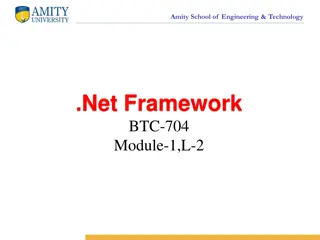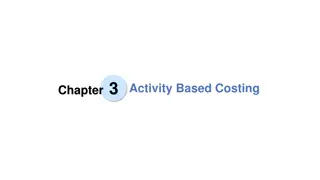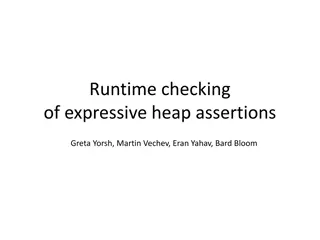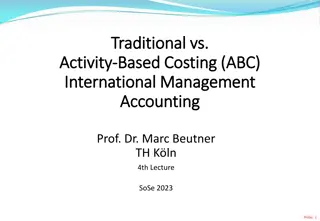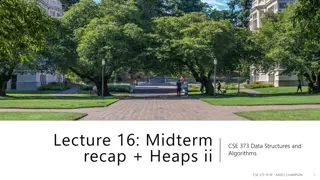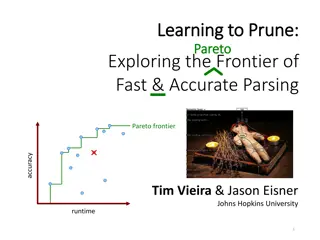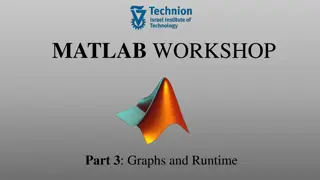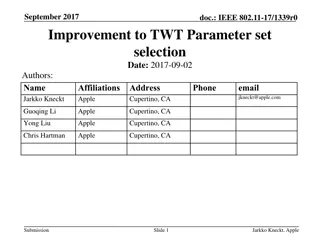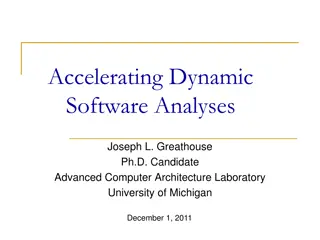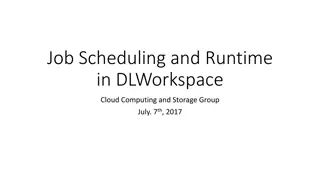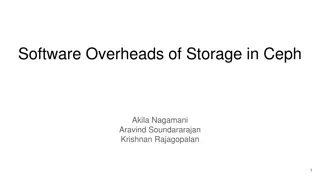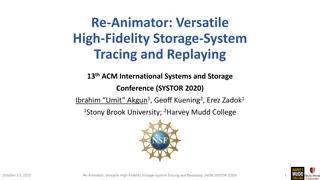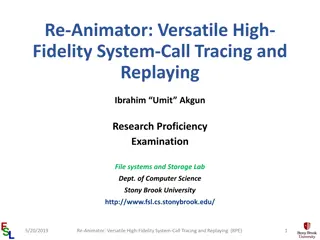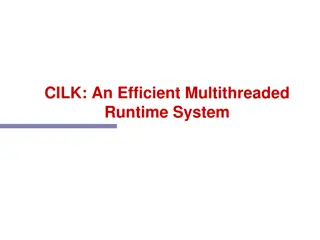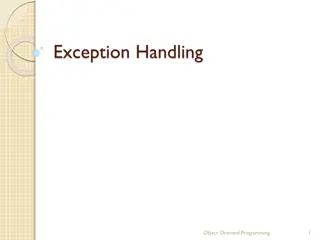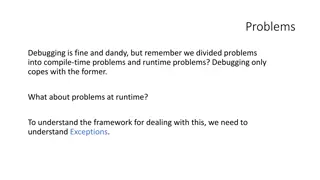Algorithm Analysis
Algorithm analysis involves evaluating the efficiency of algorithms through measures such as time and memory complexity. This analysis helps in comparing different algorithms, understanding how time scales with input size, and predicting performance as input size approaches infinity. Scaling analysi
1 views • 30 slides
Understanding Overheads in Cost Accounting
Overheads in cost accounting refer to business costs not directly tied to specific activities or units. They play a crucial role in pricing products and services to ensure profitability. Overheads are classified based on elements, behavior, function, control, and nature. This classification helps in
3 views • 20 slides
Enhancing TLB Prefetching for Address Translation Performance
This study explores methods to improve TLB prefetching efficiency by leveraging page table locality, presenting two novel approaches - Sampling-based Free TLB Prefetching (SBFP) and Agile TLB Prefetcher (ATP). These techniques focus on optimizing TLB prefetching mechanisms without disrupting the vir
1 views • 10 slides
Line Segment Intersection
Geometric intersections play a crucial role in computational geometry for tasks such as solid modeling, collision detection in robotics, and overlaying subdivisions in geographic information systems. The problem of line segment intersection involves finding all intersection points between a set of c
0 views • 17 slides
Understanding Sales Budget: A Key Tool for Business Success
A sales budget is crucial for estimating sales revenue and overheads, guiding sales team efforts, managing cash flow, setting goals, and developing core strategies. Internal factors like production capacity and product development impact sales projections, while external factors such as selling chan
1 views • 6 slides
Overview of .NET Framework and CLR Architecture at Amity School of Engineering
Explore the .NET Framework and Common Language Runtime (CLR) architecture at Amity School of Engineering & Technology, covering topics such as .NET components, technical architecture, common language runtime, CLR execution model, and more. Discover the support for multiple languages and the .NET lan
0 views • 28 slides
Dynamic Memory Allocation in Computer Systems: An Overview
Dynamic memory allocation in computer systems involves the acquisition of virtual memory at runtime for data structures whose size is only known at runtime. This process is managed by dynamic memory allocators, such as malloc, to handle memory invisible to user code, application kernels, and virtual
0 views • 70 slides
Computation of Machine Hour Rate: Understanding MHR and Overhead Rates
Computation of Machine Hour Rate (MHR) involves determining the overhead cost of running a machine for one hour. The process includes dividing overheads into fixed and variable categories, calculating fixed overhead hourly rates, computing variable overhead rates, and summing up both for the final M
4 views • 18 slides
Cost Allocation, Apportionment, and Absorption in Accounting
Cost allocation involves charging identifiable costs to specific cost centers or units, while cost apportionment distributes costs that cannot be directly identified among various departments. This process is crucial for managing overheads effectively in accounting practices. Dr. B. N. Shinde discus
1 views • 16 slides
Understanding Exceptions in Computer Science
Errors in programming, such as syntax, semantic, runtime, and logical errors, can disrupt the execution of a program. Syntax errors relate to grammatical violations, semantic errors occur when statements lack meaning, and runtime errors happen during program execution due to illegal operations. By i
1 views • 35 slides
Understanding CSR Compliance: Decoding MCA FAQs
Section 8 Companies and their profit distribution, net profit calculations under CSR, eligible CSR funds per Schedule VII, and clarifications on Administrative Overheads by MCA FAQs are covered in detail. Clear insights on CSR compliance requirements and calculations explained for better understandi
3 views • 45 slides
Understanding Activity-Based Costing (ABC) in Cost Management
Activity-Based Costing (ABC) is a strategic costing method that allocates overhead costs to products based on activities. It offers benefits such as accurate cost allocation and identifying cost drivers but also has challenges due to increased complexity and customization. ABC differs from tradition
1 views • 15 slides
Understanding Absorption and Marginal Costing in Accounting
Absorption costing, also known as full costing, encompasses all costs including fixed and variable related to production. It aids in determining income by considering direct costs and fixed factory overheads. Meanwhile, marginal costing focuses on only variable manufacturing costs and treats fixed f
0 views • 14 slides
Understanding Debugging in Programming
Debugging is a crucial aspect of programming to identify and fix errors that can cause program failures, hangs, or unexpected results. There are different types of errors such as compile errors, runtime errors, and logic errors, each requiring a different approach to resolve. Learning about the mode
0 views • 20 slides
Runtime Checking of Expressive Heap Assertions
Motivated by the unreliability of large software systems due to concurrency bugs and limitations of static analysis, the goal is to enable runtime analysis of deep semantic properties with low overhead. This involves checking expressive heap assertions at runtime with minimal impact on performance,
0 views • 15 slides
Optimizing Word2Vec Performance on Multicore Systems
This research focuses on improving the efficiency of Word2Vec training on multi-core systems by enhancing floating point throughput, reducing overheads, and avoiding any accuracy loss. The study combines optimization techniques to achieve parallel performance and evaluates the accuracy of the result
0 views • 30 slides
Understanding .NET Framework Architecture and Common Language Runtime
This content delves into the intricacies of .NET architecture, highlighting its structure, common language runtime, and key components such as Common Type System (CTS) and Common Language System (CLS). It explains how .NET supports multiple languages, facilitates cross-language interoperability, and
0 views • 13 slides
Understanding Overhead Costs in Accounting
Overhead costs are supplementary expenses that cannot be easily allocated to specific cost objects. This includes indirect materials, labor, and expenses. Accounting and control of overheads involve steps like classification, codification, collection, allocation, apportionment, absorption, under/ove
1 views • 17 slides
Understanding Overhead Costs in Accounting
Overheads in accounting consist of indirect materials, labor, and expenses not directly attributable to a specific cost object. They play a vital role in budgeting and pricing strategies for businesses. Overheads can be classified based on elements and functions, such as factory overhead, office and
0 views • 23 slides
Activity-Based Costing (ABC) in International Management: Methods and Analysis
Explore the application of Activity-Based Costing (ABC) in International Management, focusing on methods of assigning overheads, cost drivers, product and period costs, and value chain analysis. Dive into topics such as budgetary control systems, standard costing, flexible budgets, variance analysis
0 views • 48 slides
Implementing Heaps: Node Operations and Runtime Analysis
Understanding the implementation of heaps involves knowing various node operations like finding the minimum node, last node, next open space, children, and parent. The runtime analysis of heap operations such as peekMin, removeMin, and insert are crucial for optimizing performance. This recap covers
0 views • 9 slides
Dynamic Memory Management Overview
Understanding dynamic memory management is crucial in programming to efficiently allocate and deallocate memory during runtime. The memory is divided into the stack and the heap, each serving specific purposes in storing local and dynamic data. Dynamic memory allocators organize the heap for efficie
0 views • 31 slides
Understanding FAST: A Brief Overview of the Faceted Application of Subject Terminology
FAST (Faceted Application of Subject Terminology) is a subject standard with a controlled vocabulary derived from LCSH and NACO. It provides a faceted vocabulary that is easy to assign and interrogate, making it well-suited for libraries. British Library has adopted FAST as its preferred subject sch
0 views • 19 slides
Understanding Costing in TYBCOM Sem V with Dr. Satish Naringrekar
Explore the comprehensive study of costing including cost classification, composition of selling price, cost sheet format, prime cost, factory overheads, office and administrative overheads, cost of production, distribution overheads, and more in TYBCOM Sem V with the expert guidance of Faculty Dr.
0 views • 13 slides
Exploring Fast & Accurate Parsing With Learning to Prune
In this informative content, the concept of learning to prune is discussed in the context of exploring the frontier of fast and accurate parsing. It delves into the optimization tradeoff between runtime and accuracy in end-to-end systems, showcasing a Pareto frontier of different system performances
0 views • 42 slides
MATLAB Workshop: Graphs, Runtime Analysis, and Plotting Techniques
MATLAB Workshop Part 3 delves into the creation of 2D and 3D plots, along with advanced plotting commands, runtime analysis using tic and toc functions, and the utilization of the MATLAB profiler. The content demonstrates techniques for plotting multiple curves, creating subplots, and visualizing da
0 views • 22 slides
Understanding Runtime Recovery of Web Applications under Zero-Day ReDoS Attacks
This detailed content discusses the critical issue of Runtime Recovery of Web Applications facing Zero-Day ReDoS Attacks. It delves into the significance of regular expressions (regex) in handling HTTP requests, highlighting vulnerabilities and real-world impacts. The research emphasizes the severit
0 views • 31 slides
Enhancement of TWT Parameter Set Selection in September 2017
Submission in September 2017 proposes improvements in TWT parameter selection for IEEE 802.11 networks. It allows TWT requesting STAs to signal repeat times, enhancing transmission reliability and reducing overheads. Non-AP STA challenges and current TWT setup signaling are addressed, providing a me
0 views • 12 slides
Understanding the Challenges of Dynamic Software Analysis
Delve into the world of dynamic software analyses, exploring the prevalence of software errors, modern bug examples, runtime overheads, and proposed solutions in this field. Learn about the complexities of analyzing programs as they run and the associated risks and considerations.
0 views • 39 slides
Efficient Memory Virtualization: Reducing Dimensionality of Nested Page Walks
TLB misses in virtual machines can lead to high overheads with hardware-virtualized MMU. This paper proposes segmentation techniques to bypass paging and optimize memory virtualization, achieving near-native performance or better. Overheads of virtualizing memory are analyzed, highlighting the impac
0 views • 48 slides
Financial Intelligence Webinar Series: Managing Financial Risks
Explore the intricacies of financial decision-making across different timeframes, from short- to long-term, in the Financial Intelligence webinar series. Gain insights on optimizing profits, managing revenue, margins, and overheads, and conducting a comprehensive financial health check to ensure fin
0 views • 19 slides
Efficient Job Scheduling and Runtime Management in DLWorkspace Cloud Computing and Storage Group
Explore the intricate system of job scheduling and runtime management in DLWorkspace, involving SQL server, K8s Master API, Web Portal, Restful API, Cluster Manager, NVIDIA driver plugins, and shared storage. Learn about the process flow from job submission to approval, status monitoring, and device
0 views • 11 slides
Understanding Software Overheads in Ceph Storage
Exploring the impact of software layers on storage performance in Ceph, focusing on the transition to faster storage technologies like BlueStore, and analyzing the write data flow and experimental findings related to write operations.
0 views • 13 slides
Re-Animator: Versatile High-Fidelity Storage System Tracing and Replaying
Re-Animator is a system for capturing and replaying system calls that aims to benchmark storage systems, analyze application characteristics, and reproduce bugs. It addresses challenges in capturing accurate information, data buffers, overheads, replay tools, trace formats, and offline analysis. Wit
0 views • 18 slides
Re-Animator: Versatile System Call Tracing and Replaying
Re-Animator is a research project focusing on creating a high-fidelity system call capturing system with minimized overheads. The project aims to capture long-running applications and provide scalable and verifiable system call replaying. It introduces two prototype system call tracing systems and h
0 views • 39 slides
Understanding CILK: An Efficient Multithreaded Runtime System
CILK is a multithreaded runtime system designed to develop dynamic, asynchronous, and concurrent programs efficiently. It utilizes a work-stealing thread scheduler and relies on a directed acyclic graph (DAG) model for computations. With a focus on optimizing critical paths and total work, CILK enab
0 views • 44 slides
Understanding Factory Overheads and Allocation Methods
Explore the concept of factory overheads, treatment of special items, absorption methods, allocation, apportionment, and more. Learn about the classification of overheads, steps in distribution, computation of absorption rates, and practical application in cost accounting. Discover different methods
0 views • 11 slides
Comprehensive Framework for Virtual Memory Research - Virtuoso
Virtuoso is an open-source, modular simulation framework designed for virtual memory research. The framework aims to address performance overheads caused by virtual memory by proposing solutions like improving the TLB subsystem, employing large pages, leveraging contiguity, rethinking page tables, r
0 views • 29 slides
Understanding Exception Handling in Object-Oriented Programming
Exception handling in object-oriented programming enables a program to manage and recover from exceptional situations during runtime errors. Java uses exceptions to represent errors, allowing methods to throw exceptions that can be caught and handled by the caller, thus separating error detection an
0 views • 21 slides
Understanding Python Exceptions for Handling Runtime Problems
Exceptions in Python are essential for handling runtime problems and preventing programs from crashing unexpectedly. By using try-except blocks, developers can catch and manage exceptions that occur during program execution, ensuring smooth functioning. Learn how to effectively utilize exceptions to
0 views • 15 slides





